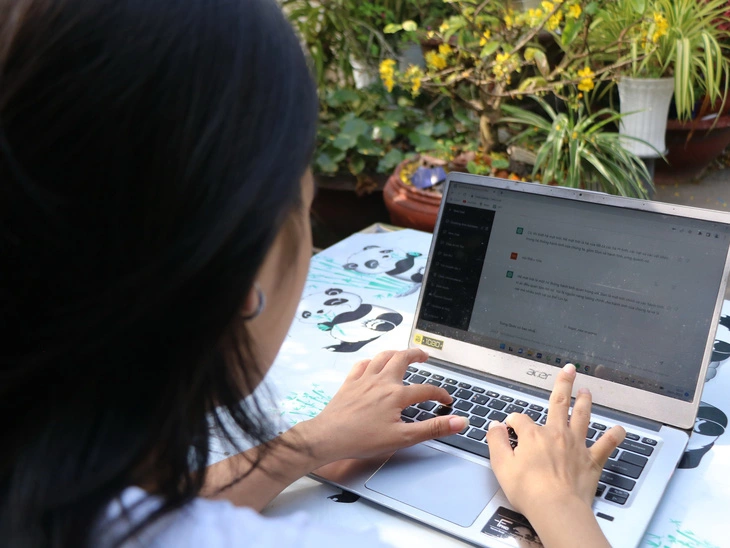The widespread embrace of artificial intelligence (AI) in learning can be a double-edged sword, with debate in academic circles revolving around how AI can be used ethically and in alignment with local academic standards.
Hoang Ngan, a sophomore at the University of Economics Ho Chi Minh City - International School of Business, uses an entire arsenal of AI tools to keep up with her studies, including ChatGPT – a chatbot developed by OpenAI – and Bing Chat – a chatbot developed by Microsoft.
Using these tools, Ngan is able to generate outlines for her essays using just a few keywords.
Once her essay is written, Ngan switches over to AI-powered writing assistant QuillBot to check for lexical and grammatical errors.
Thanh Tung, a marketing major at Van Lang University, is also heavily reliant on AI for his coursework.
“I’ve found that AI tools are useful for finding articles and research to support my presentations,” said Tung, adding that he uses at least five different AI aides on a daily basis.
“I use ChatGPT 3.5 because it is free, even though its database is not quite up to date.
“While not perfect, it saves me a lot of time.”
Tung also uses Bard – a chatbot developed by Google – and Bing Chat to answer questions posed by classmates; memobot – a voice-to-text AI application from Vietnam – to transcribe lectures from school; and American cloud-based typing assistant Grammarly to check for mistakes in his writing assignments.
Limitations abound
In November, a student from the Ho Chi Minh City University of Foreign Languages - Information Technology (HUFLIT) was handed a 50-percent score reduction for submitting an essay written with assistance from ChatGPT.
Nguyen Ngoc Vu, vice principal of HUFLIT, stated that the university had instructed students in the ethical use of AI, emphasizing transparency, responsibility, and awareness of the advantages and limitations of generative models.
According to Vu, the lecturer who gave the student the point deduction had told his classes not to use AI in their writing due to concerns that it might violate the school's code of integrity.
According to Assoc. Prof. Dr. Pham Vu Phi Ho, vice dean of the Faculty of Foreign Languages at Van Lang University, students who take English courses at Van Lang extensively utilize AI applications to enhance various aspects of their writing, including word choice, sentence structure, and idea expression.
These AI-produced essays, Ho said, often fail to show that students are able to compose a piece of decent piece of writing.
“Some essays written by ChatGPT either have a glaring lack of cohesion or repetitive ideas.
“Additionally, [ChatGPT] also can’t generate an essay that requires too much in-depth knowledge or expertise.
“That’s why it’s easy to tell apart essays written by students and essays written by AI,” Ho said.
“Students who submit essays written by AI will receive a score corresponding to their lack of effort.”
Assoc. Prof. Dr. Dinh Dien, director of Computational Linguistics Center at the University of Science under Vietnam National University-Ho Chi Minh City, acknowledged that chatbots can be a great tool for research, but also noted that they have significant limitations in answering questions about Vietnamese culture and history.
“Chatbots often provide incorrect answers to questions about Vietnamese history and culture,” Dien said.
“Queries regarding the analysis and interpretation of Vietnamese language and poetry also receive responses that are evasive and not directly relevant.”
Dien suggested that students be mindful when using AI-assisted learning tools by researching the strengths and weaknesses of these tools, as well as crosschecking information from these tools with more trustworthy resources.
Similarly, Ho suggested that students learn from AI tools by asking follow-up questions and learning from mistakes that AI corrects.
Like us on Facebook or follow us on Twitter to get the latest news about Vietnam!


















































